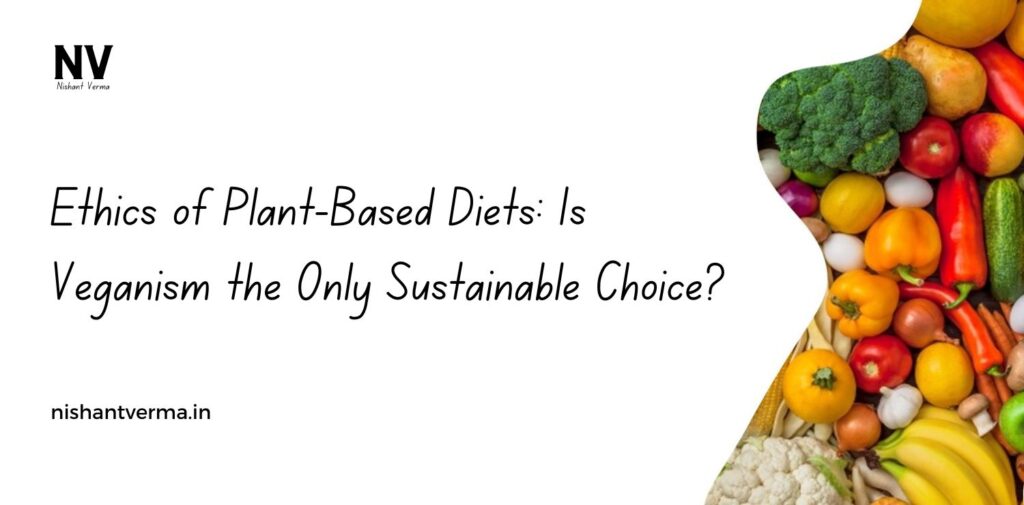In recent years, there has been a growing interest in plant-based diets, especially veganism, as people become more aware of the environmental, health, and ethical concerns related to food choices. But with so many dietary options available, is veganism the only sustainable choice? Or are there other plant-based diets that can also be a good alternative for both ethical and environmental reasons?
In this article, we will explore the ethics behind plant-based diets, the pros and cons of veganism, and other dietary choices that can contribute to a more sustainable lifestyle. We will look at how different diets impact our health, the planet, and the animals, and help you make an informed decision about what works best for you.
Understanding Plant-Based Diets
Before we dive deeper into the ethics and sustainability of plant-based diets, let’s first understand what these diets involve.
- Plant-Based Diet: This term generally refers to a diet that emphasizes whole plant foods such as fruits, vegetables, grains, legumes, nuts, and seeds. While it doesn’t necessarily mean excluding all animal products, the focus is on plants as the main source of nutrition.
- Veganism: Veganism is a type of plant-based diet that excludes all animal products—this means no meat, dairy, eggs, or honey. It goes beyond just food and also involves avoiding animal products in clothing, cosmetics, and other products.
- Vegetarianism: Vegetarians avoid meat and fish but still consume other animal products like dairy and eggs.
- Flexitarian: A flexitarian diet is mostly plant-based, but occasionally includes small amounts of meat or animal products.

Ethical Considerations: Why Choose a Plant-Based Diet?
One of the main reasons people adopt a plant-based diet is due to ethical concerns, especially regarding animal rights. Let’s take a closer look at the ethical considerations that guide people toward plant-based eating:
Animal Welfare: Factory farming, where most of the world’s meat and dairy are produced, often involves cruelty to animals. Animals are kept in cramped conditions, denied proper care, and subjected to painful procedures. By choosing plant-based diets, many people aim to reduce demand for animal products, which, in turn, reduces the suffering and exploitation of animals.
Environmental Impact: Animal agriculture is a major contributor to environmental problems such as climate change, deforestation, and loss of biodiversity. Raising animals for food requires a lot of resources—such as water, land, and food—which could otherwise be used more efficiently for growing crops. A plant-based diet is generally considered more environmentally sustainable because it uses fewer natural resources and results in lower greenhouse gas emissions compared to a diet rich in animal products.
For example:
- Land Use: It takes about 6 to 10 times more land to produce meat compared to plant-based foods.
- Water Consumption: Producing 1 kilogram of beef can require up to 15,000 litres of water, while 1 kilogram of rice requires about 2,500 litres of water.
Health Concerns: Many people adopt plant-based diets because of health reasons. Studies have shown that a plant-based diet, especially one rich in fruits, vegetables, and whole grains, can help reduce the risk of chronic diseases like heart disease, diabetes, and cancer. Plant-based diets are often lower in saturated fats and cholesterol, making them beneficial for heart health. In India, a large number of people already follow vegetarian diets, and many find it easier to transition to a fully vegan or plant-based lifestyle. Indian food culture, with its emphasis on lentils, beans, and vegetables, offers a strong foundation for a plant-based diet.
Is Veganism the Only Sustainable Choice?
While veganism is a popular and ethical choice, it is important to understand that it might not be the only sustainable option. Sustainability is not just about avoiding animal products; it is also about how we source our food, reduce waste, and make conscious choices.
Let’s explore some alternative diets and their sustainability:
Vegetarian Diet: A vegetarian diet excludes meat and fish but includes dairy products and eggs. While not as strict as veganism, a vegetarian diet still has several ethical and environmental benefits:
- Animal Welfare: A vegetarian diet helps reduce the demand for meat, but dairy and egg industries can still involve cruelty to animals, especially in factory farming conditions.
- Environmental Impact: While a vegetarian diet can still have a lower environmental footprint compared to a diet with meat, the dairy and egg industries are still resource-intensive and contribute to greenhouse gas emissions.
- Health Benefits: A well-balanced vegetarian diet can provide many of the same health benefits as a vegan diet, especially if it includes plenty of fruits, vegetables, legumes, and whole grains. I

Flexitarian Diet: A flexitarian diet is an approach that encourages mostly plant-based foods but allows for occasional consumption of animal products. This approach is less strict than veganism or vegetarianism and can be a great option for those who want to reduce their meat consumption without completely eliminating it.
- Animal Welfare: By reducing meat consumption, the flexitarian diet helps lower the demand for animal products, which can contribute to animal welfare.
- Environmental Impact: A flexitarian diet still has a lower environmental footprint compared to a meat-heavy diet, as it encourages people to consume more plant-based foods.
- Health Benefits: A flexitarian diet can provide health benefits by promoting a more balanced, plant-focused way of eating while still allowing for the occasional indulgence in animal products.
Sustainable Meat Consumption: For those who prefer to consume animal products, choosing sustainably sourced meat can help minimize the ethical and environmental impact. This includes:
- Locally Sourced Meat: Supporting local farmers who raise animals in humane conditions can reduce the carbon footprint associated with transporting meat.
- Grass-Fed and Free-Range: Choosing grass-fed and free-range meats can ensure that animals are raised in healthier, more ethical conditions.
- Smaller Portions: Reducing meat consumption overall, even if not eliminating it, can significantly lower its environmental impact.

Seasonal and Local Eating: Another important aspect of sustainability, regardless of whether you follow a vegan, vegetarian, or flexitarian diet, is eating foods that are in season and locally grown. This reduces the environmental impact of transportation, helps support local farmers, and ensures that food is fresher and more nutritious.
- Local Foods: Consuming locally grown fruits, vegetables, and grains reduces the need for long-distance transportation, which helps cut down on carbon emissions.
- Seasonal Eating: Eating food that is in season ensures that it is grown in its natural climate, which is generally more sustainable than producing it in artificial conditions.
Conclusion: Making the Right Choice for You
The question of whether veganism is the only sustainable choice depends on several factors, including individual preferences, health considerations, and environmental impact. Veganism is an ethical and sustainable choice for many people, but it is not the only option.
Other diets like vegetarianism, flexitarianism, and sustainable meat consumption also contribute to a more sustainable and ethical world. The key is to make informed decisions, whether that means adopting a fully plant-based diet or simply reducing your intake of animal products.
In India, where diverse food cultures and traditions exist, plant-based diets are already an integral part of life for many people. It’s important to recognize that sustainability is not just about avoiding animal products—it’s about making conscious food choices that benefit your health, the planet, and the animals.
Ultimately, the most sustainable diet is one that works for you, your body, and the environment, while also respecting the ethical considerations that are important to you.




